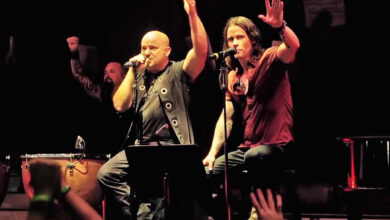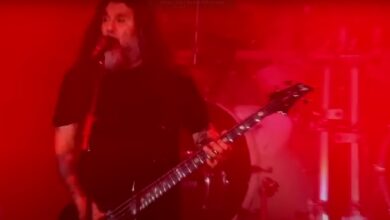Iron Maiden’s Legendary ‘Hallowed Be Thy Name’ Performance: A Night to Remember at Beast Over Hammersmith 1982
“Hallowed Be Thy Name” is one of Iron Maiden’s most iconic songs, and its performance at the Beast Over Hammersmith in 1982 is often remembered as a landmark moment in the band’s early career. This live rendition, part of their “The Beast on the Road” tour, captured the raw energy and intensity that Iron Maiden brought to the stage, solidifying their reputation as one of the premier heavy metal bands of the time.
The song itself is the closing track on their 1982 album The Number of the Beast, which marked a turning point for the band. It was the first album to feature Bruce Dickinson on vocals, and his powerful voice added a new dimension to Iron Maiden’s sound. “Hallowed Be Thy Name” tells the story of a condemned man facing his execution, contemplating life, death, and what lies beyond. The lyrics, written by bassist Steve Harris, are introspective and philosophical, exploring themes of fate and mortality.
The Beast Over Hammersmith performance was recorded at the Hammersmith Odeon in London on March 20, 1982, and it showcases the band at the peak of their powers. The concert was part of a grueling tour schedule that saw Iron Maiden performing across the UK, Europe, and North America. Despite the heavy demands of the tour, the band delivered an electrifying performance that night, with “Hallowed Be Thy Name” serving as a powerful highlight.
The live version of “Hallowed Be Thy Name” at Hammersmith features extended instrumental sections that allow the band to showcase their musical prowess. Guitarists Dave Murray and Adrian Smith shine with their intricate dual guitar harmonies, which have become a hallmark of Iron Maiden’s sound. Their interplay during the solos adds layers of complexity to the song, creating a dynamic and engaging performance that kept the audience on the edge of their seats.
Bruce Dickinson’s vocal delivery is another standout element of this performance. His ability to convey the emotional depth of the lyrics, combined with his commanding stage presence, made him the perfect frontman for Iron Maiden. At Hammersmith, Dickinson’s voice was in top form, soaring over the powerful instrumentation with clarity and passion. His dramatic interpretation of the lyrics brought the story of the condemned man to life, making the performance not just a musical experience, but a theatrical one as well.
The rhythm section, composed of Steve Harris on bass and Clive Burr on drums, provided a solid foundation for the song. Harris’s bass lines were as intricate as they were driving, adding a sense of urgency to the music that matched the intensity of the lyrics. Clive Burr’s drumming was precise and energetic, propelling the song forward with relentless momentum. Together, they created a rhythmically complex backdrop that enhanced the overall impact of the performance.
The Beast Over Hammersmith show was also significant in that it was one of the first major performances of Iron Maiden’s new lineup with Dickinson. The success of this concert and the subsequent tour helped to establish the band as a major force in the heavy metal scene. The performance of “Hallowed Be Thy Name” that night was a testament to the band’s technical skill, their ability to connect with an audience, and their dedication to delivering a memorable live show.
Iron Maiden’s performance at Hammersmith Odeon was later released as part of the Eddie’s Archive box set in 2002, allowing fans to relive this historic concert. The live recording of “Hallowed Be Thy Name” from this show is often cited as one of the definitive versions of the song, capturing the energy and excitement of Iron Maiden’s early years.
In summary, the performance of “Hallowed Be Thy Name” at Beast Over Hammersmith in 1982 remains a defining moment in Iron Maiden’s career. It showcases the band’s ability to blend complex musicianship with powerful storytelling, all while delivering a live performance that resonates with intensity and emotion. This performance is a key part of Iron Maiden’s legacy, and it continues to be celebrated by fans and critics alike.



